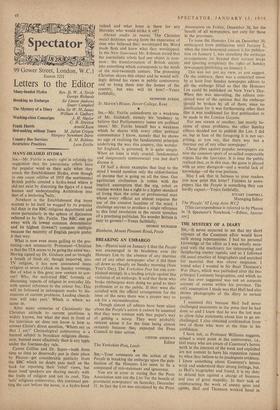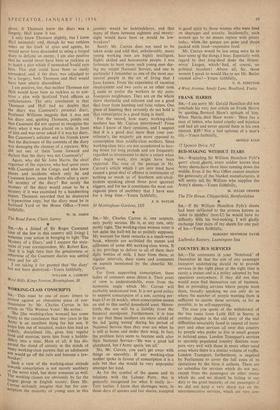THE MYSTERY OF A DIARY Sta,—It never occurred to me
that my short account of the Casement affair would have such strong repercussions. I had no personal knowledge of the affair as I was wholly occu- pied with the machinery for intercepting and deciphering enemy signals, and so I followed the usual practice of biographers and searched for material that was above suspicion. I found what I wanted in Sir Basil Thomson's War Diary, which was published after the two principal Casement biographies, and which no one has ever suggested was not an accurate account of events within his province. The only assumption I made was that Hall had also shown photographs of the diary to certain people. I assumed this because Hall had never challenged statements in the press that he had done so and 1 knew that he was the last man to allow false statements about him to go un- challenged. I also obtained confirmation from two of those who were at the time in his confidence, 1 have ndt, as Professor Williams suggests, missed a main point in the controversy, i.e., that many who are aware of Casement's heroic work in the interests of the weak and exploited are not content to have his reputation ruined by what they believe to be inadequate evidence. I know something about Casement's heroic work and understand their strong feelings, but, as Hall's biographer and friend, it is my duty to defend him against a charge of baseness and also of great stupidity. In their task of counteracting the work of enemy spies and agents, Hall and Thomson worked hand in glove. If Thomson knew the diary was a forgery, Hall knew it too.
I only knew Thomson slightly, but I knew Hall intimately and, though he was ruthless when on the track of spies and agents, he would never have descended to using a forged diary to defame an enemy. 1 am also positive that he would never have been so reckless as to hatch a plot which if unmasked 'Would ruin him. 'This plot could have been so easily unmasked, and, if the diary was adjudged to be a forgery, both Thomson and Hall would have been utterly discredited.
I am positive, too, that neither Thomson nor Hall would have been so reckless as to con- trive a plot with Scotland Yard officers as collaborators. The only conclusion is that Thomson and Hall had no doubts that the diary was Casement's personal diary. Professor Williams suggests that it was not his diary and, quoting Thomson, points out that Casement did not appear to recognise the diary when it was placed on a table in front of him and was never asked if it was his diary. But Casement's solicitor and his friends knew that the disclosure of the contents of the diary was damaging the chances of a reprieve. Why did not one of them 'come forward and declare that the diary was not Casement's?
Again, why did Sir John Harris, the chief organiser of the reprieve, who had spent years with Casement on the Congo, and who knew Places and incidents which only he and Casement knew, cease his efforts after a care- ful scrutiny of the diary? But surely the Mystery of the diary would cease to be a Mystery if it was examined by a handwriting expert. Thomson recorded that he destroyed a typewritten copy, but the diary must be in Scotland Yard or the Home Office.—Yours faithfully,
The Road Farm, Chart, Surrey W. M. JAMES



































 Previous page
Previous page